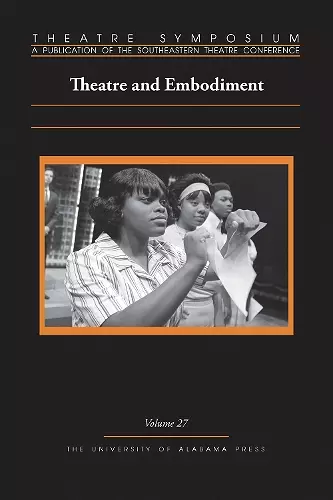Theatre Symposium, Volume 27
Theatre and Embodiment
Format:Paperback
Publisher:The University of Alabama Press
Published:30th Oct '19
Currently unavailable, and unfortunately no date known when it will be back

A substantive exploration of bodies and embodiment in theatre.
Theatre is inescapably about bodies. By definition, theatre requires the live bodies of performers in the same space and at the same time as the live bodies of an audience. And, yet, it's hard to talk about bodies. We talk about characters; we talk about actors; we talk about costume and movement. But we often approach these as identities or processes layered onto bodies, rather than as inescapably entwined with them. Bodies on the theatrical stage hold the power of transformation. Theatre practitioners, scholars, and educators must think about what bodies go where onstage and what stories which bodies to tell.
The essays in Theatre Symposium, Volume 27 explore a broad range of issues related to embodiment. The volume begins with Rhonda Blair's keynote essay, in which she provides an overview of the current cognitive science underpinning our understanding of what it means to be 'embodied' and to talk about 'embodiment.' She also provides a set of goals and cautions for theatre artists engaging with the available science on embodiment, while issuing a call for the absolute necessity for that engagement, given the primacy of the body to the theatrical act.
The following three essays provide examinations of historical bodies in performance. Timothy Pyles works to shift the common textual focus of Racinian scholarship to a more embodied understanding through his examination of the performances of the young female students of the Saint-Cyr academy in two of Racine's Biblical plays. Shifting forward in time by three centuries, Travis Stern's exploration of the auratic celebrity of baseball player Mike Kelly uncovers the ways in which bodies may retain the ghosts of their former selves long after physical ability and wealth are gone. Laurence D. Smith's investigation of actress Manda Björling's performances in Miss Julie provides a model for how cognitive science, in this case theories of cognitive blending, can be integrated with archival theatrical research and scholarship.
From scholarship grounded in analysis of historical bodies and embodiment, the volume shifts to pedagogical concerns. Kaja Amado Dunn's essay on the ways in which careless selection of working texts can inflict embodied harm on students of color issues an imperative call...
ISBN: 9780817370145
Dimensions: unknown
Weight: 220g
128 pages